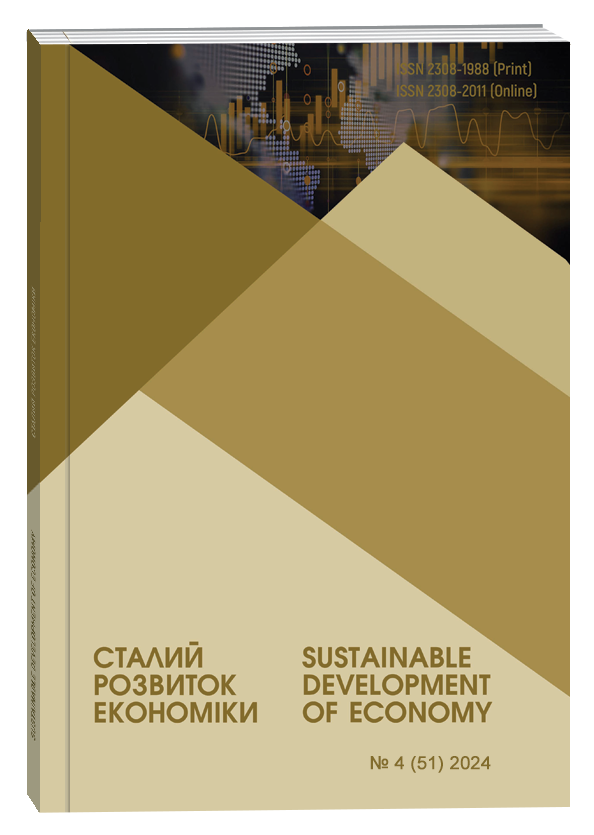STRATEGIES FOR ENHANCING THE INNOVATION POTENTIAL OF ENTERPRISES IN THE MODERN BUSINESS ENVIRONMENT
Abstract
The implementation of new technologies is essential for enhancing the innovation potential of businesses. Modern technologies, such as automation, artificial intelligence (AI), and big data analytics, help reduce costs, improve information processing speed, and enhance product quality, providing a competitive edge. Additionally, investing in human resources through training and professional development fosters a skilled and motivated workforce, promoting innovative thinking crucial for successfully implementing new technologies. Collaboration with scientific institutions offers opportunities for accessing advanced technologies and innovative ideas. Partnering with universities and research centers enables businesses to stay updated with technological trends, integrating new ideas into their innovation strategies. Evaluating innovation projects through key performance indicators (KPIs) ensures a systematic approach to performance monitoring, allowing businesses to adjust strategies, optimize processes, and remain competitive. Regular assessment of innovation initiatives helps businesses to identify strengths and weaknesses, making it possible to improve strategies based on real-time market feedback. Successful innovation strategies involve adopting new technologies, developing human resources, collaborating with scientific institutions, and regularly assessing project outcomes. These strategies help optimize processes, improve decision-making, and maintain competitiveness. Modern technologies, such as AI, big data, and the Internet of Things (IoT), contribute to faster product development, greater operational efficiency, and reduced costs. In conclusion, continuous innovation requires combining technological, human, and strategic resources. Integrating these elements fosters adaptable and competitive businesses ready to thrive in a dynamic market. Effective innovation management is key to long-term success and competitiveness, driving productivity, product quality, and market responsiveness. This ensures a sustainable future for the organization.
References
Yepifanova I., & Dzhedzhula V.. Methodology of evaluation of innovative potential of enterprises. Agricultural and Resource Economics: International Scientific E-Journal. 2020. No. 6(3). P. 171–190. DOI: https://doi.org/10.51599/are.2020.06.03.10
Anifowose O.N., Ghasemi M., Olaleye R.B. Total quality management and small and medium-sized enterprises’ (SMEs) performance: Mediating role of innovation speed. Sustainability. 2022. No. 14(14). DOI: https://doi.org/10.3390/su14148719
Kotelnikova I. Increasing the competitiveness of enterprises under the conditions of digitalization. Innovation and Sustainability. 2022. No. 4. P. 101–108. DOI: https://doi.org/10.31649/ins.2022.4.101.108
Kryvonohova I. Conceptual approaches to the development of a strategy for innovation and investment activity in a food enterprise. Scientific Bulletin of Mukachevo State University. Series “Economics”. 2021. No. 8(3). С. 60–66. DOI: https://doi.org/10.52566/msu-econ.8(3).2021.60-66.
Havrylenko N. Methodology of Assessing the Innovative Potential of Industrial Enterprises in the Digital Economy. The problems of economy. 2022. No. 3. P. 112–120. DOI: https://doi.org/10.32983/2222-0712-2022-3-112-120.
Lepeyko T., Shcherbak A. Determining factors to ensure the effective formation of the information process in the industrial enterprise management. Development Management. 2018. No. 16(4). P. 88–97. DOI: https://doi.org/10.21511/dm.4(4).2018.08.
Mahmoud Z., Angelé-Halgand N., Churruca K., Ellis L.A., Braithwaite J. The impact of lean management on frontline healthcare professionals: A scoping review of the literature. BMC Health Services Research. 2021. No. 21. 383 p. DOI: https://doi.org/10.1186/s12913-021-06344-0.
Лепейко Т.І., Мазоренко О.В. Розкриття сутності функціонування та розвитку підприємства. Економіка: проблеми теорії та практики: зб. наукових праць: у 5 т. Дніпропетровськ: ДНУ. 2007. Вип. 232. С. 1226–1231.
Супрун В.П. Структура развития экономического процесса. Актуальні проблеми економіки. 2013. № 11(149). С. 16–26.
Гомон М.В. Теоретичне обґрунтування структурних елементів регулятивного потенціалу пільгового оподаткування інноваційної діяльності. Вчені записки ТНУ ім. В. І. Вернадського. Серія: Економіка і управління. 2020. Том 31 (70). № 1. С. 47–51.
Бурдяк М.І., Томашук І.В. Загальні аспекти застосування цифрових технологій у діяльності аграрних підприємств. Управління змінами та інновації. 2023. № 7. С. 12–18. DOI: https://doi.org/10.32782/CMI/2023-7-2
Yepifanova I., Dzhedzhula V. (2020) Methodology of evaluation of innovative potential of enterprises. Agricultural and Resource Economics: International Scientific E-Journal. no. 6(3). pp. 171–190. DOI: https://doi.org/10.51599/are.2020.06.03.10
Anifowose O. N., Ghasemi M., Olaleye R. B. (2022) Total quality management and small and medium-sized enterprises’ (SMEs) performance: Mediating role of innovation speed. Sustainability. no. 14(14). DOI: https://doi.org/10.3390/su14148719.
Kotelnikova I. (2022) Increasing the competitiveness of enterprises under the conditions of digitalization. Innovation and Sustainability. no. 4. pp. 101–108. DOI: https://doi.org/10.31649/ins.2022.4.101.108.
Kryvonohova I. (2021) Conceptual approaches to the development of a strategy for innovation and investment activity in a food enterprise. Scientific Bulletin of Mukachevo State University. Series “Economics”. no. 8(3). pp. 60–66. DOI: https://doi.org/10.52566/msu-econ.8(3).2021.60-66
Havrylenko N. (2022) Methodology of Assessing the Innovative Potential of Industrial Enterprises in the Digital Economy. The problems of economy. no. 3. pp. 112–120. DOI: https://doi.org/10.32983/2222-0712-2022-3-112-120.
Lepeyko T., Shcherbak A. (2018) Determining factors to ensure the effective formation of the information process in the industrial enterprise management. Development Management. no. 16(4). pp. 88–97. DOI: https://doi.org/10.21511/dm.4(4).2018.08
Mahmoud Z., Angelé-Halgand N., Churruca K., Ellis L. A., Braithwaite, J. (2021) The impact of lean management on frontline healthcare professionals: A scoping review of the literature. BMC Health Services Research. no. 21. p. 383. DOI: https://doi.org/10.1186/s12913-021-06344-0
Lepeyko T. I., Mazorenko O. V. (2007) Rozkryttia sutnosti funktsionuvannia ta rozvytku pidpryiemstva [Revealing the essence of functioning and development of the enterprise]. Ekonomika: problemy teorii ta praktyky: zb. naukovykh prats, (in 5 vols.) Dnipropetrovsk: DNU. Is. 232. vol. 5. pp. 1226–1231. (in Ukrainian)
Suprun V. P. (2013) Struktura rozvytku ekonomichnoho protsesu [Structure of the development of the economic process]. Aktual'ni problemy ekonomiky. no. 11(149). pp. 16–26. (in Ukrainian)
Homon M. V. (2020) Teoretychne obgruntuvannia strukturnykh elementiv rehuliatyvnoho potentsialu pіl'hovogo opodatkovannia innovatsiinoi diial'nosti [Theoretical justification of structural elements of regulatory potential of preferential taxation of innovative activity]. Vcheni zapysky TNU im. V. I. Vernads'koho. Seriia: Ekonomika i upravlinnia. no. 31(70). pp. 47–51. (in Ukrainian)
Burdiak M. I., Tomashuk I. V. (2023) Zahal'ni aspekty zastosuvannia tsyfrovykh tekhnolohii u diial'nosti ahrarnykh pidpryiemstv [General aspects of applying digital technologies in agricultural enterprises]. Upravlinnia zminamy ta innovatsiiamy. no. 7. pp. 12–18. DOI: https://doi.org/10.32782/CMI/2023-7-2 (in Ukrainian)


